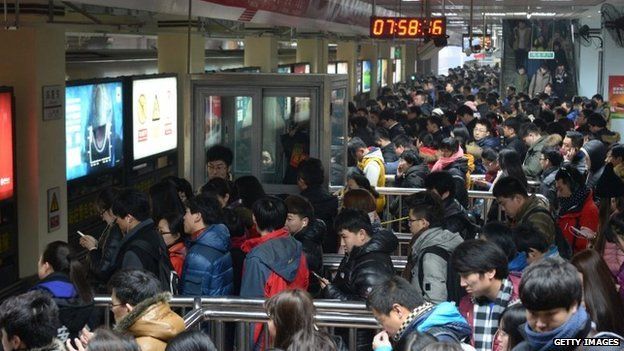China week: Beijing's long commute and Shanghai's baby count
- Published

This week we learned that urban China is getting right up there on a new parameter of inconvenient city living: length of commute.
Internet search engine Baidu has done a survey of three million citizens in 300 cities and announced that Beijing has the longest average commute in China at 52 minutes, which is longer even than New York.
I was on the Beijing subway for about 52 minutes mid-week and by the time I got off I felt I'd met a good proportion of the city's population of 21.5 million.
The mayor said this week Beijing was 'not a liveable city' but he was talking less about his commute and more about the air he breathes.
Apple love
Meanwhile I'd recommend the 52-minute average Beijing subway commute to Tim Cook, chief executive of Apple, who now increasingly relies on China's young mobile phone users to drive revenue.
Apple has just reported its last quarter earnings. Revenue from "greater China" was up 70% to $16bn £10.6bn).
The subway is a good place to watch how young Chinese urbanites are using their smartphones.
The cognoscenti seem to agree that the current success of the iPhone 6 is because Chinese consumers want bigger phones not cheaper phones.
But anyone who travels on a Chinese subway could have told Apple that long ago.
Breaking old habits
But, listen up all those who are hypnotised by the scale of the China market. In a generation, there may be fewer customers out there.
Shanghai's Family Planning Commission said this week that far fewer people than expected had taken advantage of the recent rule change that allows people to have more children.
The Qianjiang Evening News quoted a commission official as saying that 90% of Shanghai's women of child-bearing age were eligible for a second child under changes made just over a year ago, but only 5% had applied.
Talk to families and you soon realize that such vast resources of time, energy and money are spent on parenting and grand-parenting in China today that many seem depleted by the experience of raising one child and can't imagine having two.
Shanghai officials may have to do more than "urge" if they really want more households to go for a second child.
The irony of more than three decades of ruthlessly enforcing the one child policy… it's created habits that are hard to break.
Debt woes
Another Shanghai story: unpaid debts. One of China's richest men announced this week that he is suing six local governments for late payments on infrastructure contracts.
Yan Jiehe, the man behind China Pacific Construction Group, said it was a first.
A first and possibly a last, some observers mutter as they question the wisdom of a private entrepreneur challenging government in the courts.
But Mr Yan told reporters he would take the case "to the Supreme Court if necessary". As the largest private sector infrastructure boss in China, he is clearly not accustomed to losing.
All over China, local government's creditors will be watching. If Mr Yan wins, expect the flood gates to open on a rush of claims for late payment. Given the parlous state of local government finance right now, it's a case worth watching.
Land seized
All of the above are stories of big city China, but let's turn now to a story from rural China. It's a sad story I'm afraid.
According to the Southern Mongolian Human Rights Information Centre, a 45-year-old herder has hanged himself outside a government building to protest what he said was the illegal occupation of his grazing land.
According to relatives, Tumur had been petitioning the local government for years for the return of his grazing land in Abag Banner.
A too familiar story of expropriation in China ending in personal tragedy.
Dragon vs elephant
But one of the biggest stories of the week for China did not take place in China at all but in New Delhi.
Everything about President Obama's visit to India seemed calculated to send a message to Beijing, from the hug with Narendra Modi at the airport, to the Republic Day parade, the first 45 minutes of the summit meeting spent solely discussing China, and the joint statement at the end endorsing a shared strategic vision for Asia Pacific and the Indian Ocean.
Hardly surprising that the foreign policy establishment in Beijing did not like what it saw.
State media discussed the "ulterior motives of the West" in pitting a "Chinese dragon and an Indian elephant" against each other and trying to make it a zero-sum game.
Commentators consoled themselves with the thought that "three days is not enough to become true friends, given hard differences on issues like climate change, agricultural disputes and nuclear energy co-operation".
But taken together with the Sri Lankan election which removed a firm friend of China and replaced him with a new president determined to re-assess the country's commitments to China, January has been a bad month for Beijing's dreams of a "maritime silk road" in the Indian Ocean.
- Published28 January 2015
- Published27 January 2015
- Published26 January 2015